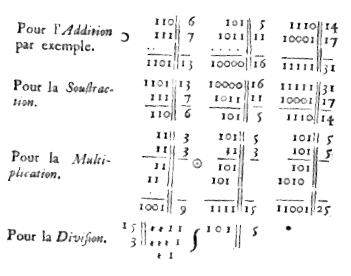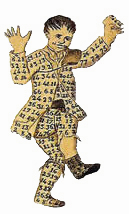Binary Number System
home | courses | topics | theorems | starters | worksheets | timeline | KS3 | KS4 | KS5
There is an interesting story to the binary system. It transpires that the first mathematician to write about it was an Indian called Pingala, who wrote about it in his work 'Chhandah-shastra' around the 500 BC (although most of the scholars now think that he lived between 300 and 200 BC).
Nothing much happened to this system until the 18 th century, when Leibniz wrote about it in his Explication de l'Arithmétique Binaire in 1705.

There he explained the ideas about the system - how to write the numbers and how to compute using all operations that you would normally in other systems.
Binary number system really made it big through the work of a British mathematician, George Boole. Boole published a paper in 1854 in which he used only two values - true and false, and constructed a whole system of algebra and logic which are now known as Boolean algebra and Boolean logic.
But how does it work? Well binary system has only two digits to represent all values: 0 and 1. (In computing this is used in such a way that 1 is produced when there is an electrical impulse and 0 when there isn't.)
So let us write few numbers in the binary. First let us look back on our own decimal system and what numbers in it 'mean'.
For example, you have a number 361. This number can be 'broken' down into
![]()
in fact, the multipliers are powers of 10, so we can write this neater as
![]()
In decimal system then, you have the powers of 10 - and you have 10 digits (0,1,2, etc.).
In a binary system you only have powers of 2 (as you have two digits only: 0 and 1).
If I write ![]() - which is read as "10 in binary", I would really mean
- which is read as "10 in binary", I would really mean
![]() (in decimal system), or
(in decimal system), or ![]() .
.
Let's do another one - convert number ![]() from binary to decimal system.
from binary to decimal system.
![]()
You can try to write in binary now, or if you think you want to practice a bit more, download a worksheet.
See about other bases
Find out about different numerals
Download a worksheet on Binary Numbers
or click on the number man to see all the worksheets...
artefacts | numerals | concepts | people | places | pythagoreans | egyptians | babylonians
_____________________________________________________________________________________________________________________
Acknowledgements | Copyright | Contact | Mission Statement | Tell a friend about this site
